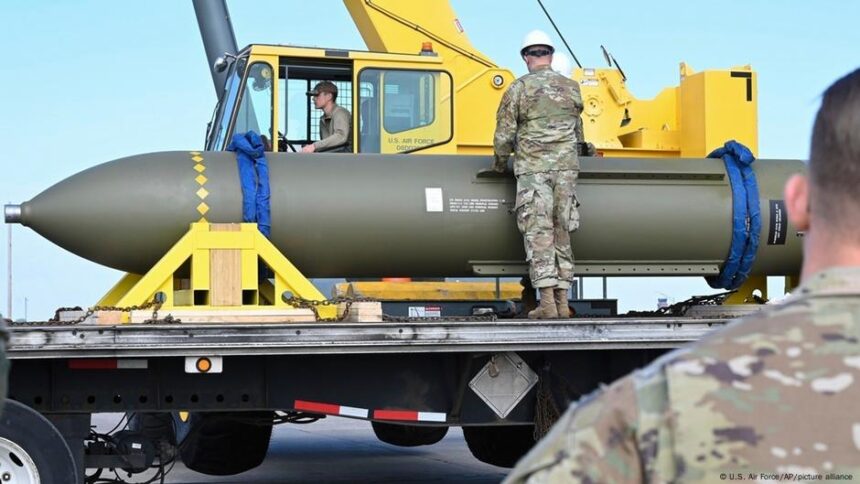Will he or won’t he? That’s the question many are asking regarding whether Donald Trump will join Israel’s attacks on Iran and take out one of its most difficult targets: the Fordow nuclear enrichment site.
But another question has arisen. Can he?
Trump signalled on Thursday that he will take two weeks to decide whether or not to strike. Guardian reporting suggests he is not fully convinced the US Massive Ordnance Penetrator bombs – better known as “bunker busters” – will effectively destroy Fordow, built deep into a mountain south of Tehran. That the 13.6-tonne bomb could fall short of that goal is a concern that some military analysts have echoed.
But it’s a coveted target for Israel, which has already destroyed some of Iran’s nuclear capability but lacks the powerful bombs and aircraft to do any real damage to the secretive site. The US is the only country in the world to possess bunker busters and only US aircraft can deliver them.
Trump sets deadline of two weeks to decide if US will join Israel’s war on Iran
Trump has set a two-week deadline to decide whether the US will join Israel’s war with Iran, allowing time to seek a negotiated end to the conflict, the White House has said.
The president also denied a report by the Wall Street Journal that he told senior aides he had approved attack plans but was delaying on giving the final order to see if Tehran would abandon its nuclear program. The report cited three anonymous officials.
But Trump’s decision is dependent on whether the Massive Ordnance Penetrator (MOP) would destroy the Fordow uranium enrichment site, a US official told Axios. Fordow, which is built into a mountain south of Tehran, is a target of Israel’s, but they lack the “bunker-buster bombs” and aircraft needed to destroy it; the US has access to both.
“We’re going to be ready to strike Iran. We’re not convinced yet that we’re necessary. And we want to be unnecessary, but I think the president’s just not convinced we are needed yet,” a US official told the outlet.
Debate within Trump’s cabinet and Pentagon chiefs over the effectiveness of the GBU-57s, a 13.6-tonne (30,000lb) bomb, was echoed in Guardian reporting, with Trump reportedly unconvinced of the bomb’s efficacy in destroying the complex and the possibility that direct US involvement could be forestalled by negotiations with Iran.
According to two defense officials who were briefed, the thinking is that only a tactical nuclear weapon could be capable of destroying Fordow because of how deeply it is located.
At a White House press call on Thursday, press secretary Karoline Leavitt delivered a message that, she said, came directly from the president, and is attributable to him.
“Based on the fact there’s a substantial chance of negotiations, that may or may not take place with Iran in the near future, I will make my decision whether or not to go within the next two weeks,” Leavitt said.
A day earlier, on Wednesday, Trump told reporters: “I have ideas on what to do but I haven’t made a final – I like to make the final decision one second before it’s due.”
He added, referring to direct involvement: “I may do it, I may not do it. The next week is going to be very big, maybe less than a week.”
Iran’s mission to the UN issued a statement saying: “Iran does NOT negotiate under duress, shall NOT accept peace under duress, and certainly NOT with a has-been warmonger clinging to relevance.”
Uncertainty around direct US involvement in the conflict comes as the Israeli prime minister, Benjamin Netanyahu, called Trump “a great friend of Israel” and thanked him “for standing by us”.
The Pentagon has sent multiple warships to the Middle East, including three navy destroyers and two carrier strike groups, while the state department has ramped up assistance to US citizens advised to leave the region.
Trump’s denial of the Journal’s report comes as a heated split in the Make America Great Again coalition over support for a strike on Iran appeared to be cooling.
The former Fox primetime host Tucker Carlson and former White House political strategist Steve Bannon had expressed concern that another Middle East military engagement in Iran would run counter to Maga’s “America first” policies.
Bannon said on Wednesday that Trump could win over Maga doubters if he made the case for Iran engagement directly to the American people. Trump also said that Carlson called him to apologize for saying that he “is complicit in an act of war”.
‘Tucker’s a nice guy. He called and apologized the other day because he thought he said things that were a little bit too strong, and I appreciated that,” Trump said on Wednesday from the White House.









